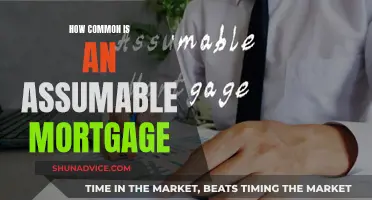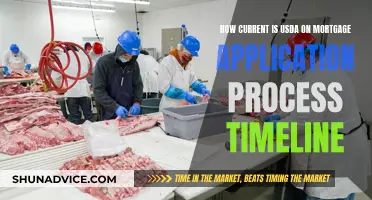
Blockchain technology is revolutionizing the mortgage industry by improving efficiency, security, and transparency. The technology offers a decentralized, digital, and distributed ledger system, streamlining the mortgage process, reducing costs and enhancing data security. With blockchain, the mortgage industry can benefit from faster transactions, improved record-keeping, and instant settlements, addressing the challenges of the traditional mortgage process, which is often slow, cumbersome, and prone to errors. Blockchain's impact on the mortgage industry is still evolving, with startups and established players exploring its potential to transform the way consumers buy homes and financial institutions manage mortgages.
| Characteristics | Values |
|---|---|
| Cost | Blockchain technology can reduce costs by removing third parties or intermediaries and eliminating the double-spend problem. |
| Speed | Blockchain technology can speed up transaction times and make settlements faster. |
| Record-keeping | Blockchain technology can create more accurate, secure, and incorruptible records. |
| Standardization | Blockchain technology can standardize processes and reduce inefficiencies and risks. |
| Security | Blockchain technology can improve data security and reduce fraud. |
| Efficiency | Blockchain technology can improve efficiency and make the mortgage process more affordable. |
| Transparency | Blockchain technology can improve transparency. |
| Education | Mortgage loan originators will need to enhance their skills and knowledge of blockchain technology to offer good service and remain compliant. |
| Regulation | With the transformation of the mortgage process, regulations will likely continue to change, and MLOs must stay abreast of the regulatory framework regarding blockchain technology. |
What You'll Learn
- Blockchain technology can improve security, efficiency and transparency in the mortgage industry
- It can also reduce costs by removing third parties and intermediaries
- Smart contracts can be drafted on blockchain, automating various facets of the mortgage process
- Blockchain can be used to authenticate documents related to mortgages, such as income statements and property titles
- Blockchain technology can help speed up transaction times, making settlements faster

Blockchain technology can improve security, efficiency and transparency in the mortgage industry
Blockchain technology has the potential to improve security, efficiency and transparency in the mortgage industry. It can streamline the mortgage process by reducing the number of intermediaries involved, thereby lowering costs. Blockchain can also speed up transaction times and create more accurate, secure records.
The mortgage industry is known to be slow-paced, with a lot of friction between each stage of the process. With blockchain technology, the various steps involved in getting a mortgage can be simplified and sped up. For instance, blockchain can be used to verify documents related to mortgages, such as income statements, credit reports and property titles. This verification process can be done by several nodes, reducing the risk of improper documentation and human error.
Additionally, blockchain technology can enhance security in the mortgage industry. The decentralised nature of blockchain, where data is managed by multiple computers in different locations, makes it difficult to tamper with records. Each block in the blockchain contains transaction data, including the amount, those involved and digital signatures, which are cross-referenced with other blocks to ensure accuracy. This makes it challenging for someone to duplicate a transaction or spend money twice.
The use of blockchain technology in the mortgage industry is still in its early stages, and full integration will require the participation of all involved parties. However, it has the potential to benefit both lenders and borrowers by improving security, efficiency and transparency in the mortgage process.
Gateway Mortgage: A Giant in the Industry
You may want to see also

It can also reduce costs by removing third parties and intermediaries
Blockchain technology is a decentralized, digital, distributed ledger or database. It can be used to record any transaction, including property purchases, and contains all the details of the transaction, such as the amount, who was involved, and what was bought. It also includes the digital signatures of each person involved.
In the mortgage industry, blockchain technology can help to streamline the process by improving efficiency and making it more affordable. One of the main ways it does this is by removing third parties and intermediaries. In a conventional mortgage process, many parties are involved, and each party needs to get paid, adding to the overall cost. Blockchain technology eliminates these extra costs by removing the need for third parties or intermediaries.
For example, blockchain technology can be used to verify documents related to mortgages, such as income statements, credit reports, and property titles. This reduces the need for costly lawyers in the mortgage application chain. Synechron, a digital business consulting and technology services provider, estimates that the cost savings from removing intermediaries could be in the billions. They state that "by automating and securing the mortgage lending processes, a blockchain-based system coordinates and identifies the agents and intermediaries and could reduce operational costs, fees, and fraud for financial institutions."
Additionally, blockchain technology can help to speed up transaction times, making settlements faster. For instance, the Bank of China Hong Kong (BOCHK) uses blockchain to process 85% of its mortgage-related property valuations, which can now be done in seconds, compared to the past when banks and appraisers had to exchange faxes and emails to produce and deliver physical certificates.
Overall, blockchain technology has the potential to revolutionize the mortgage industry by reducing costs, increasing efficiency, and making the process faster and more secure. However, it is still in its early stages, and full integration is yet to occur.
Trump Tower NYC: Mortgage and Magnificence
You may want to see also

Smart contracts can be drafted on blockchain, automating various facets of the mortgage process
Smart contracts are a key feature of blockchain technology, and they have the potential to revolutionise the mortgage process. Smart contracts can be drafted on blockchain, with various facets of the mortgage process encoded into them. Once the predefined conditions of the contract are met, it is automatically executed. This automation can streamline and speed up the mortgage process, reducing the time it takes to receive a mortgage from the traditional 30 to 60 days to just 10 minutes.
The mortgage industry is known for being slow-paced, with a lot of friction between each stage of the process. Blockchain technology can address this by improving efficiency, making the process more affordable, and enhancing security. By removing third parties or intermediaries, blockchain technology also eliminates extra costs. The decentralised nature of blockchain, with records stored on a distributed ledger, makes it difficult to tamper with and provides proper proof of all actions.
The use of smart contracts on blockchain can also reduce the risk of improper documentation and human error in the mortgage process. Each step of the process is stored as a record, which is then verified by multiple nodes on the blockchain network. This ensures the accuracy and security of the information. Additionally, blockchain technology can be used to authenticate documents related to mortgages, such as income statements, credit reports, and property titles.
While the use of blockchain technology in the mortgage industry is still in its early stages, it has the potential to significantly impact the way mortgages are handled. To fully realise the benefits of blockchain, all parties involved in the mortgage process must be on board. This includes not only the buyer and seller but also the lender and other intermediaries. By collaborating with blockchain developers and staying informed about emerging technologies, mortgage loan originators can effectively integrate blockchain into their processes and improve their efficiency.
Ruoff Mortgage Venue: Size, Capacity, and More
You may want to see also

Blockchain can be used to authenticate documents related to mortgages, such as income statements and property titles
Blockchain technology has the potential to revolutionize the mortgage industry by improving efficiency and security, streamlining the mortgage process, and reducing costs. One of the key applications of blockchain in the mortgage industry is the authentication of documents, such as income statements and property titles.
Blockchain can provide secure and tamper-proof storage for various documents related to mortgages. For example, when an individual applies for a mortgage, they need to provide income statements or tax returns to verify their financial situation. By using blockchain, these documents can be stored securely and shared with relevant parties, such as lenders or financial institutions, without the risk of unauthorized alterations. This enhances the integrity of the information and reduces the chances of fraud or identity theft.
Additionally, blockchain can be utilized to record and verify property titles. Property ownership records secured on a blockchain are challenging to tamper with and can help reduce property title disputes. This feature is especially beneficial in preventing property fraud and ensuring clear and transparent ownership records. The Bank of China Hong Kong (BOCHK) uses blockchain to process 85% of its mortgage-related property valuations, streamlining the process and reducing the time required to exchange physical certificates.
The use of blockchain for document authentication in the mortgage industry offers several advantages. It improves data security by encrypting and protecting sensitive information. The decentralized nature of blockchain, where data is distributed across multiple nodes, makes it difficult for unauthorized alterations or tampering to occur. This enhances the overall integrity of the mortgage process, reducing the risks associated with improper documentation and human error.
Furthermore, blockchain technology can speed up the verification process by allowing multiple nodes or authorities to review and validate documents simultaneously. This parallel verification process reduces the time required for document approval, contributing to faster loan processing and improving the overall efficiency of the mortgage industry.
Blend's Mortgage Revolution: Streamlining the Home Loan Process
You may want to see also

Blockchain technology can help speed up transaction times, making settlements faster
Blockchain technology has the potential to revolutionize the mortgage industry by streamlining the mortgage process, improving efficiency, and reducing costs. One of the key advantages of blockchain is its ability to speed up transaction times and make settlements faster.
The mortgage industry is known for being slow-paced, with a cumbersome and lengthy process for issuing loans. The traditional mortgage process involves multiple intermediaries and third parties, each requiring their own time and fees. Blockchain technology eliminates the need for these intermediaries by providing a decentralized, digital, distributed ledger. This ledger contains all the details of the transaction, including the amount, the people involved, and their digital signatures. Each node in the blockchain network verifies the transaction, confirming that everything is legitimate. This decentralized approach speeds up transaction times by reducing the number of parties involved and streamlining the approval process.
The use of smart contracts on the blockchain can further accelerate transactions. Smart contracts automatically execute once predefined conditions are met, reducing the time and complexity typically associated with manual processes. Additionally, blockchain technology enhances data security and reduces the risk of fraud. The distributed ledger makes it difficult to tamper with records, and the cross-referencing of blocks ensures data integrity. This added security enables faster transactions and settlements as there is less need for manual verification and fraud checks.
Furthermore, blockchain technology improves collaboration and coordination among the various agents and intermediaries involved in the mortgage process. By providing a shared, secure, and transparent platform, blockchain enables faster information exchange and decision-making. This can significantly reduce the time required for loan approvals and settlements. For example, the Bank of China Hong Kong (BOCHK) uses blockchain to process 85% of its mortgage-related property valuations, which were previously done through time-consuming fax and email exchanges.
While blockchain technology offers significant benefits, it is still in its early stages in the mortgage industry. Standardization and widespread adoption are yet to occur. To fully realize the potential of blockchain for faster transactions, all parties involved in the mortgage process must be on board and willing to embrace this new technology. Mortgage loan originators also need to enhance their skills and knowledge to offer good service and navigate the changing industry landscape.
Mortgage Industry in Texas: Size and Scope
You may want to see also
Frequently asked questions
Blockchain technology is a decentralized, digital, distributed ledger or database. It consists of three parts: a record, transaction validation, and a network of computers that verify the transaction. The record can be any transaction, from someone making a purchase to someone buying a piece of property. The record contains all the details of the transaction, including the amount, who was involved, and what they bought.
Blockchain technology can help streamline the mortgage industry by improving efficiency and making the mortgage process more affordable. It can speed up transaction time, create more accurate records, and facilitate near-instantaneous settlement. It can also reduce operational costs, fees, and fraud for financial institutions.
Blockchain technology can benefit the mortgage industry by reducing costs, increasing security, and improving efficiency. It eliminates the need for third parties or intermediaries, reducing the overall cost of the mortgage process. It also provides improved data security and automation, making the process more transparent and reliable.
While blockchain technology is still emerging in the mortgage industry, there are some notable examples of its use. For instance, Bank of China Hong Kong (BOCHK) uses blockchain to process 85% of its mortgage-related property valuations. Additionally, startups like Moneycatcha and Homechain are using blockchain to streamline the mortgage application process, making it faster and more secure.







